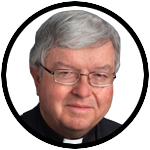
Father Kenneth Doyle
Q. Recently I read an article in a Catholic magazine that suggested that, in addition to the Ten Commandments, we should use the beatitudes when examining our conscience before going to confession. This sent me into a tailspin, and I had to go and review the beatitudes to see if I even remembered them all.
I’m afraid that I am in violation of several of the beatitudes because of my views on DACA — the call to be merciful, for example, or to “hunger and thirst for justice.” I feel that it is wrong when immigrants come here illegally and take jobs that could be held by valid U.S. citizens. But now I don’t know whether I can hold that position and still be a good Catholic. (West Long Branch, New Jersey)
A. Using the beatitudes (from the Gospel of Matthew 5:3-10) to help examine one’s conscience is a suggestion often made by Catholic teachers and preachers. The website of the U.S. Conference of Catholic Bishops says that, prior to the sacrament of penance, one should reflect prayerfully on his or her thoughts, words and actions and suggests that this examination “should be rooted in Scripture, particularly the Ten Commandments and the beatitudes.”
[hotblock]
While the Ten Commandments are expressed mainly as prohibitions (don’t steal, kill, lie, etc.) they have always seemed to me to constitute the minimum of what a Christian is expected to do. The beatitudes, on the other hand, express in an affirmative way what is required of a follower of Jesus: being poor in spirit (not coveting riches), showing mercy, acting as a peacemaker, etc.
I do not think that a Catholic is obliged to support the Deferred Action for Childhood Arrivals program (DACA) policy as an article of faith; like many pieces of legislation, it seeks to integrate Christian attitudes with what is politically feasible and practically wise — and in so doing admits of differing views. Clearly, though, the sympathies of Catholic leaders are on the side of welcoming immigrants.
Here are some things that have been said. In his Christmas Eve remarks in 2017, Pope Francis likened the Bethlehem journey of Mary and Joseph to the migration of millions of people today who are forced to leave their homelands for a better life or just for survival. Three months earlier, the U.S. Conference of Catholic Bishops had criticized the planned suspension of DACA, suggesting that the deportation of those who had come to America as minors would not reflect who we are as Americans.
As to the letter writer’s concerns about “taking jobs from Americans,” most of the research suggests that DACA has in fact benefited the U.S. economy — with no adverse impact on employment opportunities for those who are native-born.
Q. A few months ago, I went to my grandnephew’s wedding. He married outside the church because his Catholic parish wanted $1,000 for them to get married there. I was sad for this couple and embarrassed, too. No wonder that many couples chose a non-church wedding. This couple does intend to have a priest bless their marriage later, and I pray that they do. (Michigan)
[hotblock2]
A. I am truly sorry for your grandnephew’s experience, and I regret especially that it resulted in his being married outside the church. I, too, will pray that they have the marriage blessed (“convalidated”) by a priest.
Some parishes do suggest a certain fee for the use of the church for a wedding — especially for an historic church or chapel. (These are often located in inner city areas and depend heavily on such revenues for maintaining the facility.)
Frequently, though, a parish recommends no set amount or range, and it is left to the bride and groom to decide whether to make a donation, which most couples traditionally do. I prefer that option, because then the offering is more likely to match the couple’s financial circumstances.
Such donations are usually modest, especially in comparison to the couple’s other spending — particularly on the wedding reception. There are some churches that tell regular parishioners, when asked, that there is no fee at all since the couple is already contributing to the support of the parish at weekend Masses.
And finally, as the U.S. bishops’ conference’s website For Your Marriage notes, “In no case … should financial circumstances prevent a couple from approaching the church for marriage.” That is consistent with the church’s Code of Canon Law, which directs priests to take special care “that the needy are not deprived of the assistance of the sacraments because of poverty” (Canon 848).
***
Questions may be sent to Father Kenneth Doyle at askfatherdoyle@gmail.com and 30 Columbia Circle Dr., Albany, New York 12203.
PREVIOUS: Readings of the Holy Mass – Fifth Sunday of Lent
NEXT: Pope: Present in the Eucharist, Jesus transforms those who receive him


Share this story